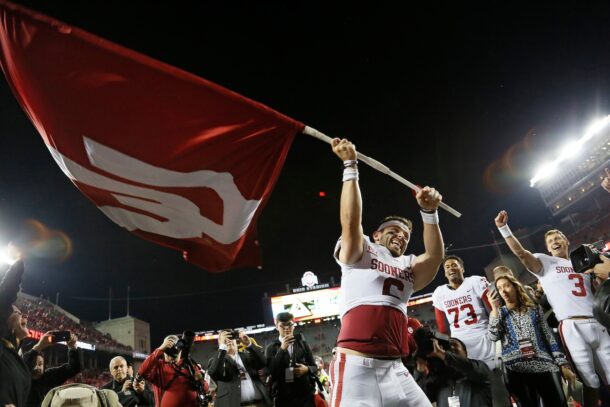When the SEC instituted a rule banning transfers with a record of sexual assault or domestic abuse, it did more than take a stand against violent crime. It started a huge shift in behavioral management in college sports.
The SEC took an unprecedented step during conference-wide meetings at the end of May, establishing a rule that prevents transfers with a history of sexual assault or domestic violence from entering the league.
Given the public incidents involving football players in the last year — most notably NFL players Ray Rice, Adrian Peterson and Aaron Hernandez, though to a lesser extent in SEC country, Jonathan Taylor — the rule splashed headlines across a lot of newspapers and websites.
The more nuanced, interesting aspect, though, isn’t that the SEC has banned men involved with violent crime from its member institutions.
For better or worse, individual football programs — and their universities — have been responsible for making independent decisions on behavioral issues. This rule changes that autonomy, and opens the possibility for the SEC to expand its legislative reach for more petty instances of behavioral issues in the near future.
A player can fail a drug test at one university and get kicked off the team, then fail 10 at another and start every Saturday. LSU running back Jeremy Hill sucker-punched a student outside a bar, and Tigers coach Les Miles determined his fate by conducting a team vote. Presumably wanting to maximize their chances of winning, the players voted Hill back onto the team.
Often the standard at one school is higher than the standard at another. The only judge and jury is public opinion, and some carefully-hurled barbs from opposing coaches and athletic directors.
Under the SEC’s new policy, which is limited in scope for now, the commissioner’s office will be able to dictate to the teams which players they can and can’t recruit as transfers. It’s a small step, but it shifts the onus from the individual schools, which have diverging interests.
The SEC probably will generate a half-billion dollars in revenue this next year. Head football coaches at Ole Miss and Mississippi State are getting paid more than $4 million per season. With financial incentives like that, plenty of programs can talk themselves into giving a kid a second or third chance if it means gaining a little edge that could make the difference in a win or a loss.
Until this point, the conference offices have avoided meddling. If one school wanted to take on a player with a troubled past, and another one didn’t, so be it. Certain schools, at least from a competitive, on-field standpoint, are more in favor of league-wide legislation than others.
“Competitive disadvantage” has become a conference buzz word in 2015. Georgia and Arkansas, for example, tend to stand by harsher disciplinary rules than many other SEC schools. They’d like it if the other schools were forced to abide by the same rules.
In essence, the SEC is saving programs from themselves. Separating the desire to win from the desire to make ethical decisions. Preventing a conflict of interest. Protecting the league brand.
But outgoing commissioner Mike Slive offered what can only be considered a stern warning. In his opinion, the SEC office never should resemble the NFL’s, which legislates punishment for all its teams and players on nearly every front.
“I’ve always been opposed to the conference having the authority or requirement to sanction a student at an institution for behavior unrelated to athletics,” Slive said, according to USA Today. “That’s something I wouldn’t want, and I don’t think it’s appropriate for the conference office to be involved in that kind of assessment. That belongs on the campus. I made that abundantly clear.”
The new rule is going to make it very difficult for the SEC to remain hands off. Once you legislate one behavioral issue, you open yourself up to criticism that you aren’t legislating another.
For example, the new rule blocks players “subject to official university or athletics department disciplinary action at any time during enrollment at any previous collegiate institution … due to serious misconduct,” which the SEC has defined as sexual assault or domestic abuse. By my non-professional interpretation of the legalities, a recruit, signee or even a player already attending an SEC institution would be excluded from this rule.
In other words, based on the new rule, the SEC wouldn’t tell Georgia that Taylor had to go after his first domestic violence charges.
Surely that’s something the SEC will have to address soon. It’s admirable for the SEC to take a stand against violence and abuse, whether or not it’s sexual in nature. But there are other crimes that the SEC should outlaw if the conference is going to ban those. And what if a player is innocent — falsely accused?
Is the SEC set up to spend millions of its dollars on private investigations? Does the league have the resources to hire police liaisons on every team? Both of those are in place in the NFL.
Whether or not it intended to do so, the SEC has opened a giant can of worms. Like it or not, these issues are going to require more discussion, more legislation and more defining of boundaries.
Since the launch of the SEC Network, the conference’s brand never has become more important. TV revenues are an increasing percentage of every school’s operating budget, and that will continue. The league office can and should protect the brand — The Shield, as the NFL refers to their icon.
The SEC should protect schools from themselves and protect schools from harming the overall brand. It’s just going to need to be very, very careful about how it does that. Implement too many rules and you’ve created a resource problem, not to mention a potential disadvantage as it relates to the rest of the country. NCAA autonomy for the power conferences in some ways has put the onus on individual conferences to play the role of the bad parent, and some are more willing than others to do so.
But the SEC also needs to be careful not to come across as hypocritical or like it’s doing this as a publicity stunt (“look what leaders we are to take a stand against violence.”)
Public ridicule, both from the media and from fan bases (especially opposing ones) never has been stronger. It’s the biggest deterrent at this point in time, even forcing a made man like Nick Saban to feel enough pressure to aggressively defend his decision to bring on a player like Taylor.
The SEC office has put itself into a tight spot, but not an impossible one.
“That’s an area in which we don’t have expertise and it’s almost impossible to be consistent,” Slive said of dictating behavioral policies, according to USA Today. “There’s so many variables and so much you need to know. If you’re going to pass judgment on somebody, there’s so many things you need to know that we don’t know that the schools can and should know.”
Just like compensation for players, the issue of legislating behavioral issues from a conference-wide standpoint is just getting started. This is the first step in a large evolution.
An itinerant journalist, Christopher has moved between states 11 times in seven years. Formally an injury-prone Division I 800-meter specialist, he now wanders the Rockies in search of high peaks.







